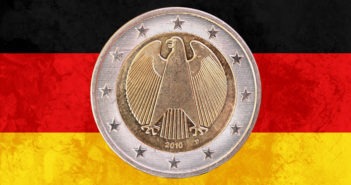- Germany is expected to report a report an outright contraction in Q3.Â
- If realized, the news could weigh on the Euro regardless of the low expectations.
- A recession in Germany seems unlikely, but a negative quarter means it cannot be ruled out.
Germany, the largest economy in the euro-zone, publishes its preliminary Gross Domestic Product report for Q3 on Wednesday, November 14th, at 7:00 GMT.
The de-facto leader of the European Union is not only the most-populated country in the bloc, not only has the largest economy but usually leads also in growth: the economy expands the gap with its peers, notably France.
But this time may be different. Consecutive disappointments in industrial output, unimpressive consumption, sliding purchasing managers’ indices, and even a squeeze in the trade balance surplus resulted in very low expectations.
The economic calendar shows a consensus of -0.1% QoQ – a slide in the size of the economy, or contraction. The preliminary growth rate in the euro-zone for the same quarter stands at 0.2%. an update for the euro area’s GDP growth will be released at 10:00 GMT.
Back in Q2, Germany enjoyed a healthy expansion of 0.5% QoQ, above the currency bloc’s growth rate of 0.4%. All in all, Germany is expected to drag the euro-zone down, lag rather than lead.
Year over year, growth is projected to decelerate to 1.2% against 2.3% in Q2, nearly half.
EUR/USD reaction – as expected is not good enough
The Euro is already suffering from the ongoing Italian crisis. The third-largest economy remained stagnant in Q3, but Italy’s shadow on the common currency originates from the clash between Italy and the European Commission over Italy’s budget breach. The US Dollarenjoys the Fed’s hawkish message.
So, the world’s most popular currency pair is already in a vulnerable position. Also, if the German economy squeezes, it is bad newsregardless of expectations. Contagion is more significant when it comes from the top.
Therefore, even an “as expected†outcome of -0.1% could send EUR/USD down.
What happens if the economy “only†stagnates? On the one hand, it is better than expected. On the other hand, Germany does not lead the euro-zone forward.
Therefore, a positive growth rate will be needed to support the common currency amid the Italian crisis and the dollar’s strength.
And the economy squeezes more than expected, EUR/USD could come under immense pressure.
Recession?
The standard definition of a recession is two consecutive quarters of negative growth. If Q3 GDP growth is an outright contraction, it will take Q4 to repeat the outcome for headlines to scream that Germany is in recession.
Most economists in the central European country do not expect that outcome. The current state of the Euro helps German exports.
However, fear after an adverse outcome could become a self-fulfilling prophecy that could manifest itself. To a recession.
There is also a contagion effect: if the German economy squeezes, other countries could suffer. If they haven’t suffered in Q3 like Italy, they could fall in Q4.
All in all, even if Germany the locomotive only reverses on the tracks for one quarter, the train could still derail.
Conclusion
The German economy probably shrank in Q3. The publication of a contraction or even a stagnation could weigh heavily on the euro. A surprise with positive growth may be needed to stabilize EUR/USDamid unfavorable market conditions for the pair.
More:Â EUR/USD Forecast: 3 reasons for breaking the double-bottom, now challenging downtrend support



